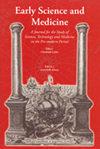记忆是肤色的问题吗?论拉丁文《记忆》评注中的记忆障碍(1250-1300)
IF 0.5
2区 哲学
Q3 HISTORY & PHILOSOPHY OF SCIENCE
引用次数: 0
摘要
这篇文章的重点是用中世纪评论家提出的肤色理论来解释亚里士多德在他的论文《记忆与回忆》中概述的记忆病理或功能障碍。更具体地说,它关注的是亚里士多德关于年轻人和老年人的问题,迟钝和机敏的问题,在拉丁文注释中浓缩成一种我们称之为“对立面的焦虑”的焦虑和忧郁的焦虑,质疑肤色对记忆的影响。我们考察了阿尔伯特大帝(1200-1280)、托马斯·阿奎那(1225-1274)和拉多弗斯·布里托(1320/21)给出的三种截然不同的解决方案,以阐明他们在记忆描述中对肤色理论的使用和解释。在这些解释中出现的主要问题是,哪种肤色最适合记忆。本文章由计算机程序翻译,如有差异,请以英文原文为准。
Is Memory a Matter of Complexion? On Memory Disorders in the Latin Commentaries on De memoria (1250–1300)
This article focuses on the use of the theory of complexions made by medieval commentators to explain the pathologies or dysfunctions of memory as outlined by Aristotle in his treatise on Memory and Reminiscence . More particularly, it focuses on the Aristotelian issues of the young and the old, the slow- and quick-witted, condensed in the Latin commentaries into an aporia that we will call the “aporia of the opposites” and into the aporia of the melancholics, questioning the influence that complexions can exert on memory. We examine three contrasting solutions, as given by Albert the Great (1200–1280), Thomas Aquinas (1225–1274), and Radulphus Brito (d. 1320/21), to shed light on their use and interpretation of theories of complexion within their accounts on memory. The main question that arises in the midst of these interpretations is about which complexion is the most appropriate to memory.
求助全文
通过发布文献求助,成功后即可免费获取论文全文。
去求助
来源期刊

Early Science and Medicine
HISTORY & PHILOSOPHY OF SCIENCE-
CiteScore
0.50
自引率
0.00%
发文量
22
审稿时长
>12 weeks
期刊介绍:
Early Science and Medicine (ESM) is a peer-reviewed international journal dedicated to the history of science, medicine and technology from the earliest times through to the end of the eighteenth century. The need to treat in a single journal all aspects of scientific activity and thought to the eighteenth century is due to two factors: to the continued importance of ancient sources throughout the Middle Ages and the early modern period, and to the comparably low degree of specialization and the high degree of disciplinary interdependence characterizing the period before the professionalization of science.
 求助内容:
求助内容: 应助结果提醒方式:
应助结果提醒方式:


